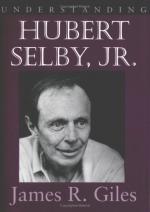|
This section contains 1,225 words (approx. 5 pages at 300 words per page) |

|
SOURCE: "Life in Four Letters," in The Saturday Review, New York, Vol. XLVII, No. 45, November 7, 1964, pp. 23-4.
Hicks was an American literary critic whose famous study The Great Tradition: An Interpretation of American Literature since the Civil War (1933) established him as the foremost advocate of Marxist critical thought in Depression-era America. Throughout the 1930s he argued for a more socially engaged brand of literature but after 1939 sharply denounced communist ideology and adopted a less ideological posture in critical matters. In the review below, Hicks defends Selby's use of profanity in Last Exit to Brooklyn as an effective tool in drawing an accurate and valuable picture of life at society's margins.
The Battle over the four-letter words or Anglo-Saxon monosyllables or whatever one chooses to call them has been won, for the higher courts seem to have firmly established that no word is obscene in and of itself. For...
|
This section contains 1,225 words (approx. 5 pages at 300 words per page) |

|


